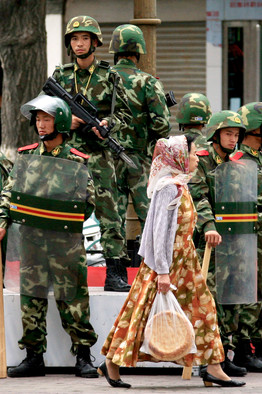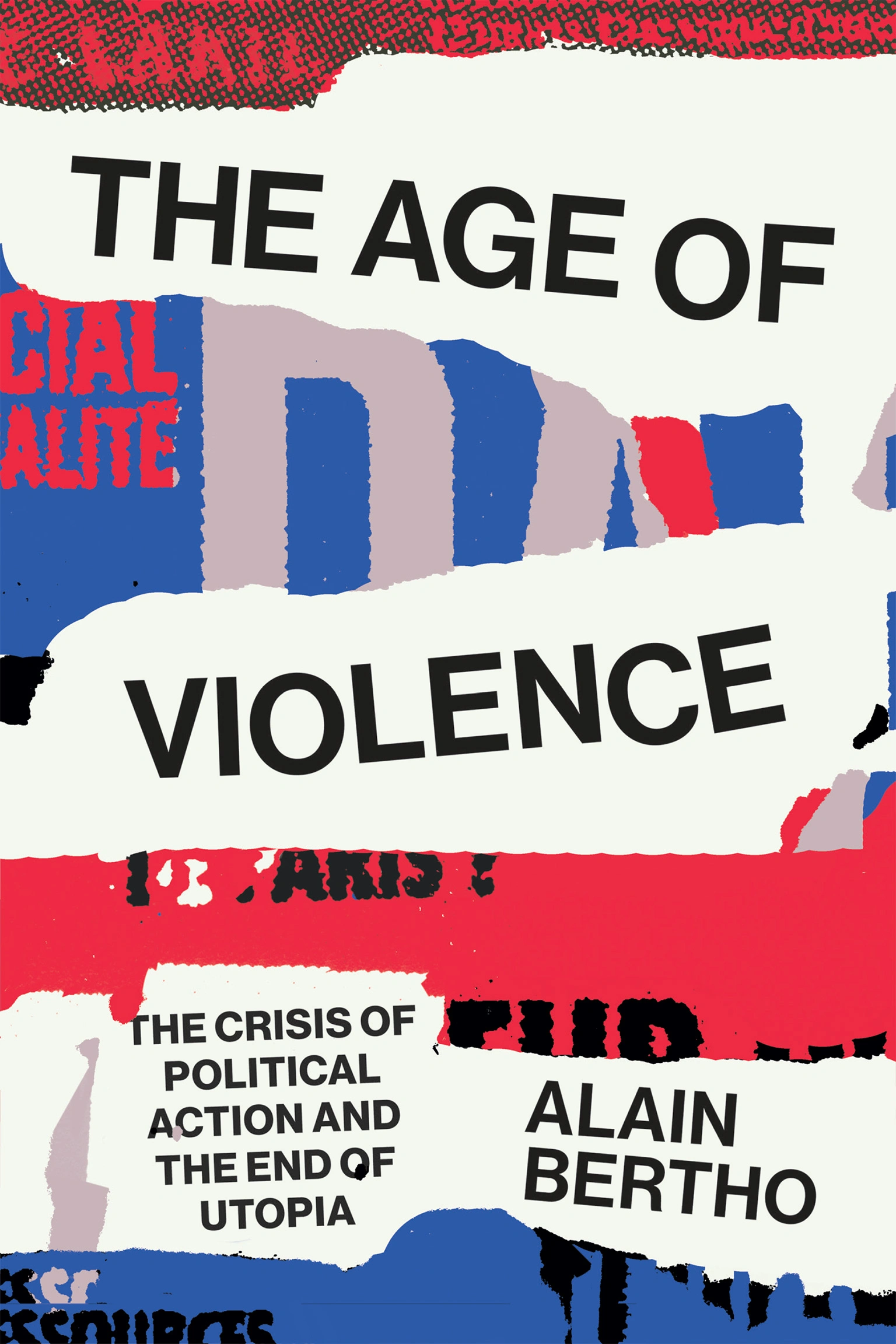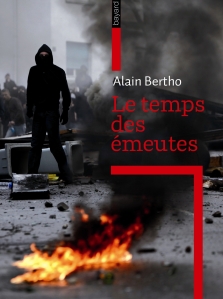Lois sécuritaires en Chine – août 2009

Beijing Widens Paramilitary Police Role
s.wsj.net
28 août 2009
By SKY CANAVES
BEIJING — China formally authorized paramilitary forces to handle riots, terrorist attacks and other social disturbances under a law passed Thursday, reflecting the government’s heightened concerns with stability ahead of the 60th anniversary of the founding of the People’s Republic of China on Oct. 1.
Chinese paramilitary police, shown in the city of Urumqi in July, helped to quell clashes in the region between Muslim Uighurs and Han Chinese
The law, which takes effect immediately, provides a legal framework for activities the People’s Armed Police have long engaged in. Last month, the force played a prominent role in quelling riots in Xinjiang, the far-west region where Muslim Uighurs clashed with Han Chinese, killing at least 197 people.
China has been taking steps to increase security ahead of the important 60th anniversary, for which Beijing is planning large celebrations. The Xinjiang unrest added to fears that anniversary celebrations could be disrupted by groups opposing the government. This week, President Hu Jintao made his first trip to Xinjiang since the riots, where he urged security forces to maintain stability in the restive region.
Normally, new laws are subject to at least three readings by China’s top legislature, the National People’s Congress, before they are passed. The armed-police law was passed after only the second reading in the legislature’s bimonthly meeting this week.
Under the legislation, county-level governments will no longer be authorized to call up armed police. Instead, the mobilization and deployment of armed police will be centralized and fall under rules to be issued by the State Council and Central Military Commission. The change is an apparent bid to prevent small protests from escalating into confrontations between villagers and paramilitary forces, whose presence would sometimes inflame tensions.

(Reuters) Paramilitary police official Tuo Chengxiang salutes the audience as he is introduced before the start of a media conference in the Great Hall of the People at Beijing‘s Tiananmen Square.
The law also aims to add greater procedural protections for citizens, prohibiting illegal searches, seizures and arbitrary detentions by the armed police and explicitly ordering them not to cover up crimes.
The People’s Armed Police was established in 1982 as an internal security force to protect politicians, infrastructure and resources and has about 680,000 members, according to the state-run Xinhua news agency. Over the years it has taken on a broader range of duties. It has also been involved in disaster-relief efforts and in missions such as protecting the Olympic torch during last year’s world-wide relay.
China lawmakers clarify role of riot police

Thu Aug 27, 2009
BEIJING (Reuters) – Chinese lawmakers on Thursday passed legislation bolstering central control of paramilitary police and spelling out their role in quelling riots and protests, less then two months after deadly unrest in Xinjiang.
The Standing Committee of the National People’s Congress, China’s legislature, approved a law governing the People’s Armed Police (PAP), the security force used to quell domestic unrest, as well as guarding officials and key installations, the China News Service said.
The PAP would « participate in handling riots, disruptions, serious violent crimes, terror attacks and other emergencies. »
The PAP has 660,000 troops, the government said in 2006. Its role in enforcing Communist Party control was recently highlighted in Xinjiang, the far-west region where Muslim Uighurs rioted on July 5, killing at least 197 people, most of them Han Chinese.
The PAP was also used to stifle protests across Tibetan areas last year. It is conspicuous on the streets of the capital, Beijing, especially around big events such as last year’s Olympic Games and the upcoming October 1 celebrations of the 60th anniversary of the founding of the People’s Republic of China.
An earlier draft of the law suggested county-level officials could mobilize PAP troops in some situations. A subsequent revision removed that authorization amid fears that local officials could inflame unrest by mobilizing troops.
« The provision that county-level authorities could mobilize and use People’s Armed Police aroused considerable misgivings, » Xinhua news agency reported on Tuesday.
The law says the State Council, or cabinet, and the Central Military Commission, which oversees both the People’s Liberation Army and the PAP, can mobilize and deploy the PAP. But it says governments above the county level can request their involvement.
« Given the increasing role of the PAP, it’s important to clarify their role… That doesn’t mean it’s illegitimate to deploy riot troops when there is rioting, » said Nicholas Bequelin, of Human Rights Watch, adding there were concerns over the PAP’s detention of suspects, especially in Tibet.
« The question is whether the troops are accountable and use proportional violence in quelling incidents. »
The law says that although the PAP can dispel crowds that threaten social order and establish checkpoints to cordon off an area, troops are limited in detaining or searching people or raiding homes without a warrant.
China’s legislature is controlled by the ruling Communist Party. The Standing Committee is an inner council that meets more often than the annual full parliamentary session.
Usually a draft law must be considered at three separate legislative sessions before it can become law, but this time the Committee made an exception, putting it onto the books after only two readings.
(Additional reporting by Lucy Hornby)
Chine : approbation d’une loi sur la police armée

27/08/2009 © 2009 XINHUA / CHINE INFORMATIONS
L’Assemblée populaire nationale (APN, parlement chinois) a approuvé jeudi la première loi sur la police armée du pays. Ce texte prévoit non seulement les nouvelles obligations de la police mais aussi son autorité statutaire pour répondre aux émeutes, aux attaques terroristes et à d’autres urgences.
La Loi sur la Police armée populaire de la République populaire de Chine stipule la mobilisation de la police armée pour affronter les émeutes, les situations chaotiques, les violences criminelles graves, les attaques terroristes et les autres situations d’urgence.
En période d’insurrection, les membres de la police armée pourront effectuer des patrouilles armées dans les municipalités autonomes et les capitales provinciales et régionales de la Chine. Elles auront en plus la responsabilité de sécuriser les principales voies de communication et les principaux bâtiments publics.
Sans définir les moments où de telles activités seront autorisées, la loi indique que la police armée devra aussi assister les autres forces chargées du maintien de l’ordre pour arrêter, poursuivre des criminels ou dans des missions d’escorte.
La Police armée populaire de la Chine a été fondée en 1982 en tant que force de sécurité intérieure destinée à des missions diverses allant de la protection des personnalités politiques importantes à la lutte contre les incendies dans les villes.
La police armée chargée de la lutte contre les émeutes en Chine

28/8/2009 par AFP
Le parlement chinois a adopté jeudi une loi chargeant officiellement la police armée populaire (PAP) de la lutte contre les émeutes et les attaques terroristes, a rapporté l’agence Chine Nouvelle. La police armée populaire, qui, selon des chiffres de 2006, compte 660.000 membres, était déjà chargée dans les faits de cette tâche, mais cette nouvelle loi permet de clarifier la situation en matière de maintien de l’ordre.
Le comité permanent de l’Assemblée nationale populaire (ANP, parlement) a adopté jeudi la loi « qui donne (à la PAP) de nouvelles responsabilités avec une autorisation légale pour répondre aux émeutes, aux attaques terroristes et autres urgences de sécurité publique », selon Chine Nouvelle.
La PAP, qui dépend à la fois du gouvernement et de l’armée, avait été déployée l’année dernière au Tibet pour faire face aux émeutes de mars, puis à Urumqi le mois dernier après les émeutes ethniques meurtrières dans la capitale de la région autonome du Xinjiang (nord-ouest).
L’adoption de la loi intervient en pleine période de renforcement sécuritaire pour éviter tout incident à l’occasion des festivités du 60e anniversaire du régime communiste le 1er octobre.
La Chine connaît chaque année des dizaines de milliers de désordres civils, officiellement désignés sous le terme d' »incidents de masses », qui peuvent aller de rassemblements pacifiques aux émeutes violentes.
中國‧闡明武警處置暴力犯罪職責‧《人民武裝警察法》通過

2009-08-28
(中國‧北京)中國全國人大常委會週四(8月27日)通過了《人民武裝警察法》。
中國通訊社報導,這部法律對中國人民武裝警察部隊(PAP)執行安全保衛、搶險救災等任務進行了規範,明確了武警部隊參加處置群體性嚴重暴力犯罪事件的職責。
根據新華社報導,武警將“執行的安全保衛任務包括參加處置暴亂、騷亂、大規模嚴重暴力犯罪事件、恐怖襲擊事件和其他社會治安事件”。
政府於2006年表示,武警部隊擁有66萬人。新疆烏魯木齊騷亂事件加強了武警部隊協助政府實行管制的角色。
武警部隊去年也參與鎮壓西藏地區爆發的抗議行動。
它在2008年京奧以及即將來臨的建國60週年慶祝活動等重大節慶皆扮演重要角色。
《人民武裝警察法》草案此前建議,縣政府官員可在某種情況下動用武警部隊,但顧及當地官員可能過度使用武力,激怒民眾,經重審將之撤除。
《人民武裝警察法》不限制動用武警的政府級別。報導指,管制武警部隊的中國國務院以及中央軍事委員會,將制定特定條規。
星洲日報/國際‧2009.08.28
Paramilitary for social unrest

Aug 28, 2009
New law passed yesterday authorises People’s Armed Police to handle social unres BEIJING – FACED with a growing tide of social unrest, China yesterday approved a law spelling out for the first time the role of the paramilitary police force in quelling riots and bolstering Beijing’s control of its deployment.
The law, passed by the national legislature, came less than two months after deadly riots in the western region of Xinjiang were brought under control by the paramilitary People’s Armed Police (PAP).
The paramilitary police will handle rebellion, riots, large-scale serious criminal violence, terror attacks and other social safety incidents, according to the text of the law released by the official Xinhua news agency last night.
But it cannot detain people or search them or their property illegally.
A key part of the country’s armed forces, the 680,000-strong paramilitary police force stationed across the country has long been used to put down domestic unrest as well as guard key installations, government offices and borders.
But the new law, which takes immediate effect, clarifies and provides a legal basis for their role in quelling riots. It also clearly sets out the chain of command – amid concerns that some local leaders fan unrest by misusing the troops as a sort of private army.
The law states that the State Council, or China’s Cabinet, and the Communist Party’s top military body, the Central Military Commission – which oversees both the People’s Liberation Army and the paramilitary police – will have the final authorisation for deployment of the paramilitary force.
An earlier draft of the law suggested that county-level officials could mobilise paramilitary police troops in some situations but this was later revised.
At a press conference after the law was passed yesterday, National People’s Congress official Wang Shangxin told reporters: ‘The joint authorisation by the State Council and the Party’s Central Military Commission is how the PAP has worked for many years; it has proven effective.’
This centralisation of deployment in Beijing’s hands ‘makes it more difficult for local governments to abuse their power when demonstrations take place and suppress the people while giving fabricated reports to higher authorities’, said China expert Huang Jing of the Lee Kuan Yew School of Public Policy.
Commentaires
Cette Police Armée du Peuple a des effectifs impressionnants (600 000). En taux de force répressive par habitant, cette mesure met la Chine au niveau… de la France avec ses 15 000 CRS et ses 16 000 gendarmes mobiles. Un pour 2000 dans les deux cas.









